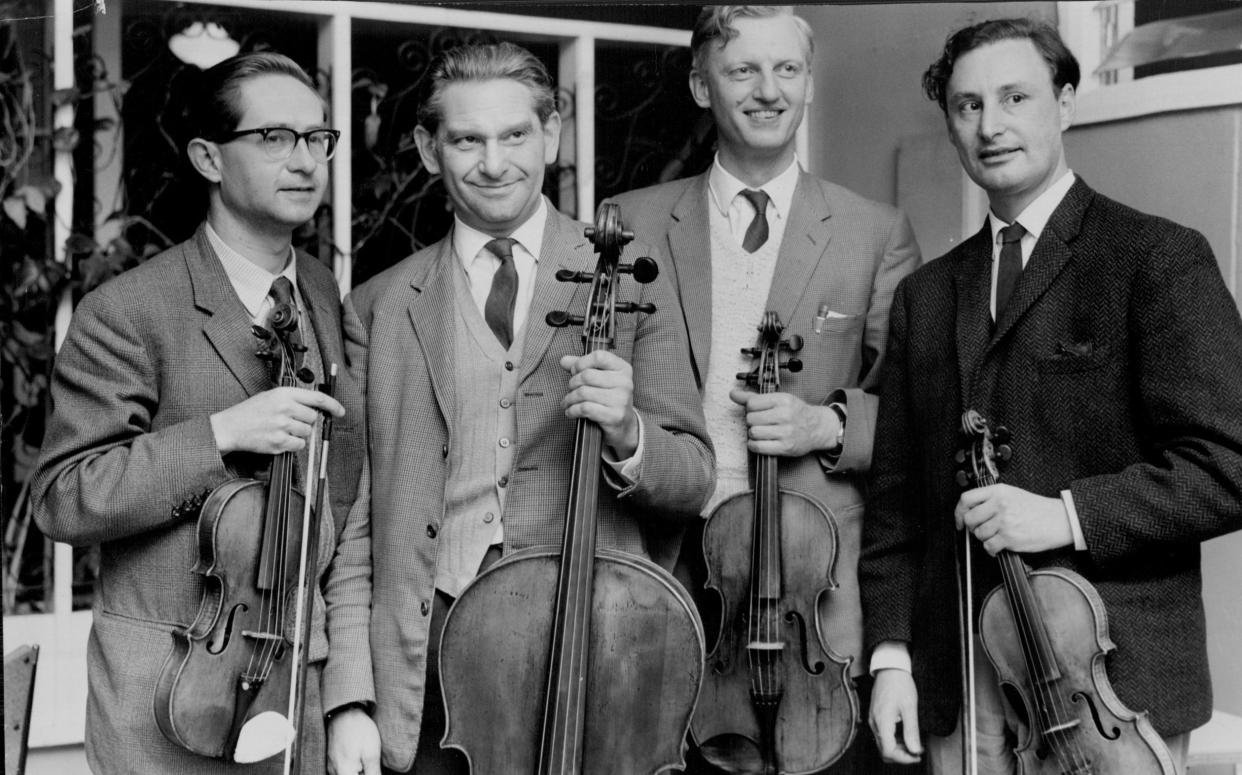Patrick Ireland, founding viola player of the Allegri String Quartet – obituary

Patrick Ireland, who has died aged 100, was the founding viola player of the Allegri String Quartet; officially the quartet was named after Gregorio Allegri (1582-1652), regarded as the first composer to write for string quartet, though others suspected that their name was chosen to be above their great rivals, the Amadeus Quartet, in alphabetical listings.
With Eli Goren and James Barton (violins) and William Pleeth (cello), the quartet rehearsed 66 times before giving their first concert in 1953. They were soon heard on radio, on record and in the concert hall, performing not only Haydn, Mozart and Beethoven, but also works by Britten, Tippett and Rubbra, who dedicated his third quartet to them.
They were chosen by Sir John Barbirolli for his recording of Elgar’s Introduction and Allegro with the Sinfonia of London and collaborated with the clarinettist Gervase de Peyer, the pianist Fou Ts’ong and the violist Cecil Aronowitz. In 1961 they were the subject of one of Humphrey Burton’s first television documentaries and in his memoir, In My Own Time (2021), Burton describes Ireland as “an exceptionally beautiful man”.
After the quartet’s performance of Schubert’s Death and the Maiden quartet at the Wigmore Hall in 1966, a Daily Telegraph critic wrote how “the Allegri players, apart from demonstrating their impeccable ensemble, produced great refinement of tone and a buoyant, forward-driving rhythm”.
Ireland was a fine violist, known for producing a rich and mellow sound. Away from the quartet he collaborated with Yehudi Menuhin, including in the Bath Festival Orchestra and as a viola teacher at the Yehudi Menuhin School.
They also appeared together in Mozart’s Sinfonia Concertante for violin and viola and in 1959 recorded Bach’s Brandenburg Concerto No 6, which calls for two solo violas. In 1961 Ireland was the Proms soloist in Vaughan Williams’s Flos Campi, which according to one critic he delivered with “a passionate sensibility and a wealth of colour”.
William Patrick Ireland was born at Helston, Cornwall, on November 20 1923, the younger of two sons of William Ireland, a dentist, and his wife Eileen, an artist. Choral singing was a family tradition and he became a chorister at St Paul’s Cathedral, singing at the Silver Jubilee of George V in 1935 and winning a music scholarship to Wellington College.
Called up by the RAF, he trained as a bomber pilot and served in coastal patrols in 1945. The following year he returned to music, studying violin with Max Rostal and at the Royal College of Music before reading French and Music at Worcester College, Oxford.
Ireland joined the Peter Gibbs Quartet in 1948 as second violin, switching to viola when the original violist left. When they disbanded in 1953, he considered becoming a museum curator, but Pleeth persuaded him to try a new group of musicians. The Allegri String Quartet soon came into being and the following year Ireland picked up a “battered” Amati viola for the princely sum of £300.
In 1977 he was appointed assistant head of strings at the Royal Northern College of Music in Manchester, sharing a smoke-filled office with the cellist and future BBC producer Eleanor Warren. He continued to play chamber music, including quintets with the Lindsay Quartet. Meanwhile, his 1971 recording of Mozart’s Kegelstatt Trio with Jack Brymer (clarinet) and Stephen Bishop (piano) was described by Gramophone magazine as “unfailingly beautiful”.
Ireland was a splendid craftsman and was still making fine wooden furniture in his mid-nineties. He met the pianist Peggy Gray at the Royal College of Music, when she invited him to play through the Brahms D minor violin sonata. They were married in 1948. She died in 2021 and he is survived by their four children two of whom, Robin and Richard, are professional musicians.
Patrick Ireland, born November 20 1923, died February 14 2024

 Yahoo News
Yahoo News 
